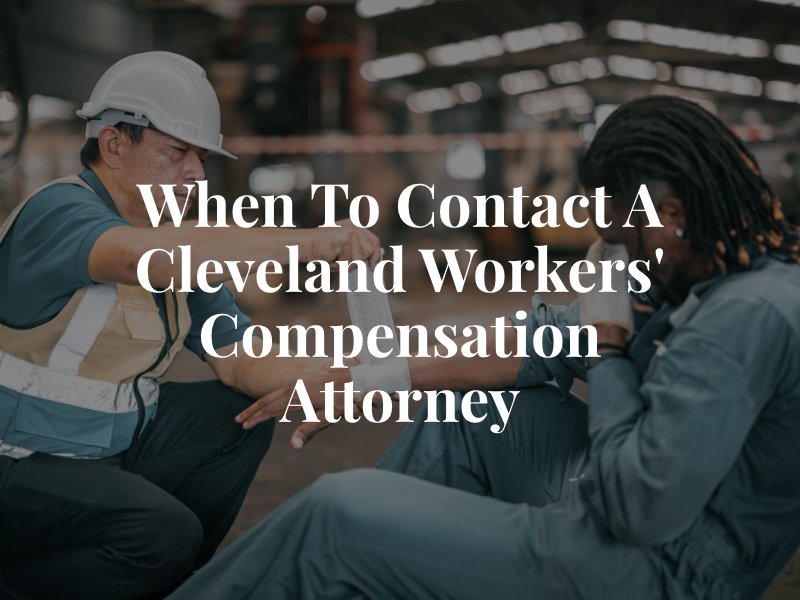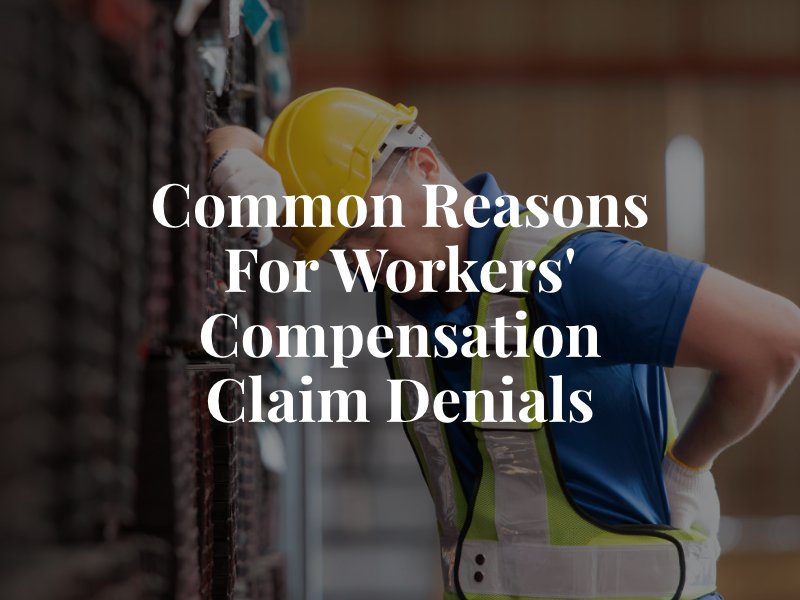Cleveland Workers’ Compensation Lawyer
Ohio’s workers take on some of the toughest and most essential jobs. Whether you’re a machinist, factory worker, construction laborer, or hospital staff member, you’ve likely dedicated years to physically demanding work. When a workplace accident happens, you deserve to feel supported. Unfortunately, the workers’ compensation system can be overwhelming, with strict deadlines and complex processes that leave many feeling lost.
If you’re facing these challenges, know that you’re not alone. Our Cleveland workers’ compensation attorney is here to help you navigate the claims process and fight for the benefits you need. Contact us today for a free consultation.
Why Choose Elk & Elk For Your Workers’ Compensation Claim?

At Elk & Elk Co., Ltd, our goal is to make sure you are taken care of financially during your recovery and have the tools you need to return to work as soon as possible. That could involve retraining, assistive devices or other accommodations to compensate for your injury. While dealing with the workers’ compensation process can be difficult, our decades of combined experience make it much easier. Our law firm helped injured workers throughout Ohio for a long time. We can and want to help you, too.
Call (216) 313-9774 or contact us to schedule a free appointment to discuss your situation.
Are You Eligible for Workers’ Compensation in Cleveland?
Many people think that only construction workers and other labor-intensive jobs are eligible for workers’ compensation, but that is not true. While those industries may see a higher number of injuries, if you were hurt while working at your job — almost any job — you can seek workers’ compensation benefits. Possible scenarios include:
- A nurse who injured his or her back while lifting a patient
- An office worker who slipped and fell in the break room
- A welder who suffered a serious burn at a job site
- A sales representative who broke an arm at a customer’s office
In Ohio, workers’ compensation coverage applies to a wide range of industries, though there are some exceptions based on the type of job or employment classification. To help clarify, here’s an overview of industries that can and cannot file a workers’ compensation claim in Ohio:
Industries That Can File a Workers’ Compensation Claim in Ohio:
- Manufacturing: Includes factory workers, machinists, and assembly line workers.
- Construction: Covers general contractors, electricians, plumbers, and laborers.
- Healthcare: Includes nurses, doctors, aides, and other hospital staff.
- Retail: Covers cashiers, stockers, and sales associates injured while working.
- Education: Teachers, school staff, and administrators who sustain injuries in the course of their duties.
- Transportation and Logistics: Truck drivers, delivery personnel, and warehouse workers.
- Public Sector Employees: Police officers, firefighters, and government office workers.
- Agriculture: Farmers, field workers, and equipment operators (if the employer is required to carry coverage).
Industries/Jobs That Cannot File a Workers’ Compensation Claim in Ohio:
- Independent Contractors: Unless misclassified, they are generally not covered.
- Volunteers: Most unpaid workers, such as volunteer firefighters, are not eligible unless specified by state law or covered by an employer’s policy.
- Domestic Workers: Nannies, housekeepers, and caretakers hired directly by households often aren’t covered.
- Certain Agricultural Workers: Employees working for small farms with fewer than three workers may be excluded.
- Self-Employed Individuals: Unless they have opted into workers’ compensation coverage for themselves.
- Federal Employees: Covered under federal workers’ compensation programs rather than Ohio’s system.
- Railroad Workers: Covered by federal acts such as the Federal Employers Liability Act (FELA).
If you’re unsure about eligibility, consulting with a workers’ compensation attorney in Ohio can help clarify specific circumstances.
Eligibility Requirements for Workers’ Compensation in Ohio
To be eligible for workers’ compensation in Ohio, you must show the following:
- You are an employee. Some companies falsely claim that their employees are actually contractors to get out of offering workers’ compensation benefits.
- The injury was an accident. Ohio has a no-fault system when it comes to workers’ compensation. Even if you were careless, that does not invalidate your claim.
- The injury happened while you were on the job. You do not have to be at your workplace to satisfy this requirement. Many Cleveland workers do off-site jobs in other cities or even in Pennsylvania or New York. If you were on the clock and being paid, you are eligible.
- The injury occurred as a direct result of your job. This is straightforward in many cases, such as being hit by a piece of heavy equipment. However, some injuries do not happen all at once — they are cumulative. These injuries include repetitive stress injuries, exposure to toxic substances over a long time and a compromised heart or blood vessels. In these cases, detailed and specific medical records can establish that a health condition is directly related to your work.
Proving some of these elements can be trickier than you think, so it is always best to consult with workers’ compensation attorneys if questions arise. It could mean the difference between receiving compensation and making do without.

When to Contact a Cleveland Workers’ Compensation Attorney
Sometimes a system that’s intended to help you can do the opposite. While many injured workers have positive experiences with workers’ compensation, not everyone does. You should contact an attorney immediately if you have experienced any of the following:
- Your employer does not believe you were injured. This could be a case of your boss thinking your injury did not occur on the job or doubting you were injured at all and accusing you of fabricating your story.
- You have not received needed medical care. You may not have found a suitable doctor, or your company may be discouraging you from seeking treatment.
- You have not received payment. Workers’ compensation is supposed to bridge the financial gap when you are unable to work. If that has not happened, you need to involve an attorney.
- An insurance company’s lawyer has asked you for a statement. Insurance companies always want to avoid paying if they can, and one way they do that is by getting you on record and then using your own statement against you. A Cleveland workers’ compensation attorney will prevent them from twisting your words.
- You have opted to represent yourself in a lawsuit, and someone is trying to exploit your lack of legal knowledge. Lawsuits are challenging, and people with expertise will try to take advantage of you if they sense that you do not have legal experience. Having your own attorney will prevent simple errors that could undermine your case.
- You have not received benefits or treatment that an insurance company promised. Insurance companies will not always do what they say they are going to do. When the promised help never arrives, an attorney can help you get the benefits you deserve.
This is only a partial list of scenarios that demand workers’ compensation lawyers involvement in your case. If you have questions about your situation, please contact us as soon as you can. The sooner we know the details, the sooner we can help you.
Steps to File a Workers’ Compensation Claim
The workers’ compensation system in Ohio is different from every other state. In most places, employers carry workers’ compensation insurance, just as they would for other potential liabilities. In Ohio, though, a state-run agency, the Bureau of Workers’ Compensation (BWC), operates the entire system. This can make the whole claims process more complicated, depending on how things go.
After a workplace injury, here are the steps you should take to receive benefits:
- Make an official injury report to your employer. Start by talking to your supervisor. Many employers have official forms that you will need to fill out. Be as specific and detailed as possible, including the time of the incident, any witnesses, what your injuries were and what caused them.
- Get medical treatment. You should do this as soon as possible, regardless of how severe you think your injury is. You should see a physician with experience in workers’ compensation cases, as they know how much documentation you will need.
- Contact the BWC and file a report. The BWC has a form called the First Report of Injury (FROI) that you must file within a certain time. You can do this yourself or your physician or employer can do it on your behalf.
After you have filed your report with the BWC, it will contact you and either approve or deny your benefits within 28 days. If it denies your benefits, you can appeal the decision.
How Long Do I Have to File a Workers’ Compensation Claim?
Filing your workers’ compensation claim within the required timeframes is critical to protecting your rights. In Ohio, you must file your claim with the Bureau of Workers’ Compensation (BWC) within one year of your injury, as outlined under Ohio Administrative Code Rule 4123-3-08(D)(1). Missing this deadline could mean losing your ability to recover benefits.
If you are considering filing a personal injury lawsuit against a third party, you have two years from the date of your injury to take legal action under Ohio Revised Code § 2305.10 (A). Understanding these deadlines is essential to ensuring your claim moves forward, whether through workers’ compensation or a third-party liability claim.
Workers’ compensation claims can be denied for a variety of reasons, leaving you without the benefits you need after an injury. Understanding the most common reasons for denials can help you prepare a stronger claim and avoid delays in receiving compensation. If your claim has already been denied, knowing why can guide you in appealing the decision.
Insufficient Documentation
Incomplete or vague documentation is one of the most common reasons claims are denied. Your injury report should include detailed information about how your injury occurred, the extent of your injuries, and any witnesses to the event. Failing to include essential details or omitting medical records can make it harder to connect your injuries to your job responsibilities.
Employer Disputes
Your employer may challenge your workers’ compensation claim, leading to delays or denials of the benefits you need. Employers often argue that your injury did not happen at work, was unrelated to your job, or existed before your employment. Examples of disputes employers frequently raise include:
- Your employer claims your injury happened outside of work hours or at a location unrelated to your job.
- Your employer argues that your injury existed before your employment and was not caused by your work activities.
- Your employer disputes your claim because they believe you did not report your injury promptly or follow proper procedures.
- Your employer challenges your account, citing the lack of witnesses to confirm your version of events.
- Your employer claims your injury resulted from activities not connected to your job responsibilities.
Procedural Errors
Filing a workers’ compensation claim involves specific steps and strict deadlines. Missing paperwork, incomplete forms, or failing to meet submission deadlines can result in your claim being denied. These procedural errors are often avoidable, but they can have serious consequences if not addressed promptly.
Common procedural mistakes include forgetting to complete all sections of the required forms or submitting your claim past the deadline. Delays in reporting your injury to your employer can also complicate the process, as timely reporting is often a key requirement.
Understanding Your Compensation Options After a Workplace Accident
If you suffered an injury at work, you may be eligible for various forms of compensation, depending on your circumstances. Workers’ compensation benefits can cover your medical expenses, replace lost wages, and provide vocational training if you need to transition to a new career. In some cases, you may also have the option to file a personal injury claim against a third party for additional compensation.
Contact Our Cleveland Workers’ Compensation Lawyer Today
The workers’ compensation process can be complicated, especially when you are recovering from an injury. To ensure that everything proceeds smoothly, it is always a good idea to learn what a seasoned workers’ comp attorney in Cleveland can do for you. Contact us for a free consultation and see how we can guide you through the process. We are available through our online contact form or by phone: (216) 313-9774.
